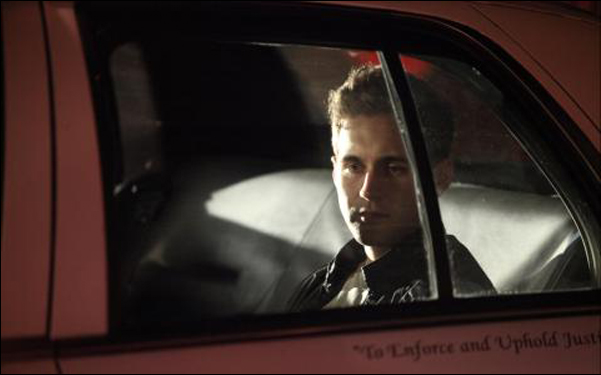It was two years ago that the world was introduced to Coatwolf, a filmmaking collective that quite literally roared onto the scene with Evan Glodell’s “Bellflower,” the engine of its signature car, the fire-breathing Medusa heralding a love story unlike any other. That fire still burns in “Coldwater,” the first feature from one of its main architects, “Bellflower” editor Vincent Grashaw, and while what “Bellflower” did so well was to apply its gearhead philosophy to the mechanics of the heart, “Coldwater” is no less finely crafted, but it goes where there is no love, resembling Brad, the tough sumbitch at its center, its grip on the audience as tightly clenched as one of the angry young man’s fists throughout.
Brad (P.J. Boudousqué) has a lot to be angry about, considering he’s introduced being pulled kicking and screaming out of bed in the dead of night with his parents silent as he’s whisked away in an SUV to God know where. When he awakens, he finds himself in the midst of Col. Frank Reichert (James C. Burns), a former member of the armed services who makes his living now in the netherlands of California where no one much pays attention, only cash, to his youth rehabilitation center, a place that “readjusts” at-risk teens with hard labor and discipline. One wouldn’t even need to see one of Brad’s fellow inmates slit his wrists with a pickaxe on one of his first days there to know this is a fate worse than prison, but just how much worse is revealed as the film wears on, along with glimpses of the trouble that led Brad here.
There’s a detachment to the way Grashaw tells the story, particularly in the way the copious violence in the film is depicted, but also a cool efficiency that makes it undeniably effective, especially once Brad sets his mind on fleeing the coop. Alternately complicating and making matters easier is the arrival of Brad’s old buddy Gabriel (Chris Petrovski), who has even more problems with falling in line than Brad has and becomes the variable that becomes arguably the film’s greatest source of tension.
Boudousqué, who in the right light could easily be mistaken for Ryan Gosling and emits the same flippant vibe, is strong as Brad in every sense, though he and Petrovski don’t ever completely sell the idea their characters were besties, a failing seemingly more of the script than the actors because any moments where the film goes soft-hearted, mostly in its flashbacks, feel more like an half-hearted appeal for sympathy where it’s unneeded.
“Coldwater” is at its best when it lets the emotions emerge gradually from its steely characters rather than when they’re demonstrated openly, the reserved feelings ultimately building to a frenzied crescendo at the end. Grashaw’s experience as an editor and the intuitive work of editor Eddie Mikasa show in the finale, which reflects the fractured perspective of its leads whose lives have been frozen in time as it also replicates their restlessness. Likewise, as calm and steady as Grashaw’s direction can be, there’s a feeling of full-on rebellion lurking just underneath the surface. In a debut that’s akin to storming the castle, Grashaw proves himself as a filmmaker who takes no prisoners.
“Coldwater” does not yet have U.S. distribution.




